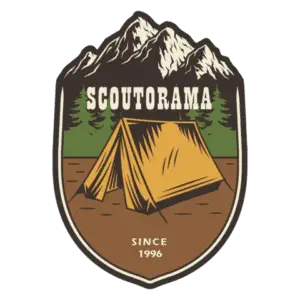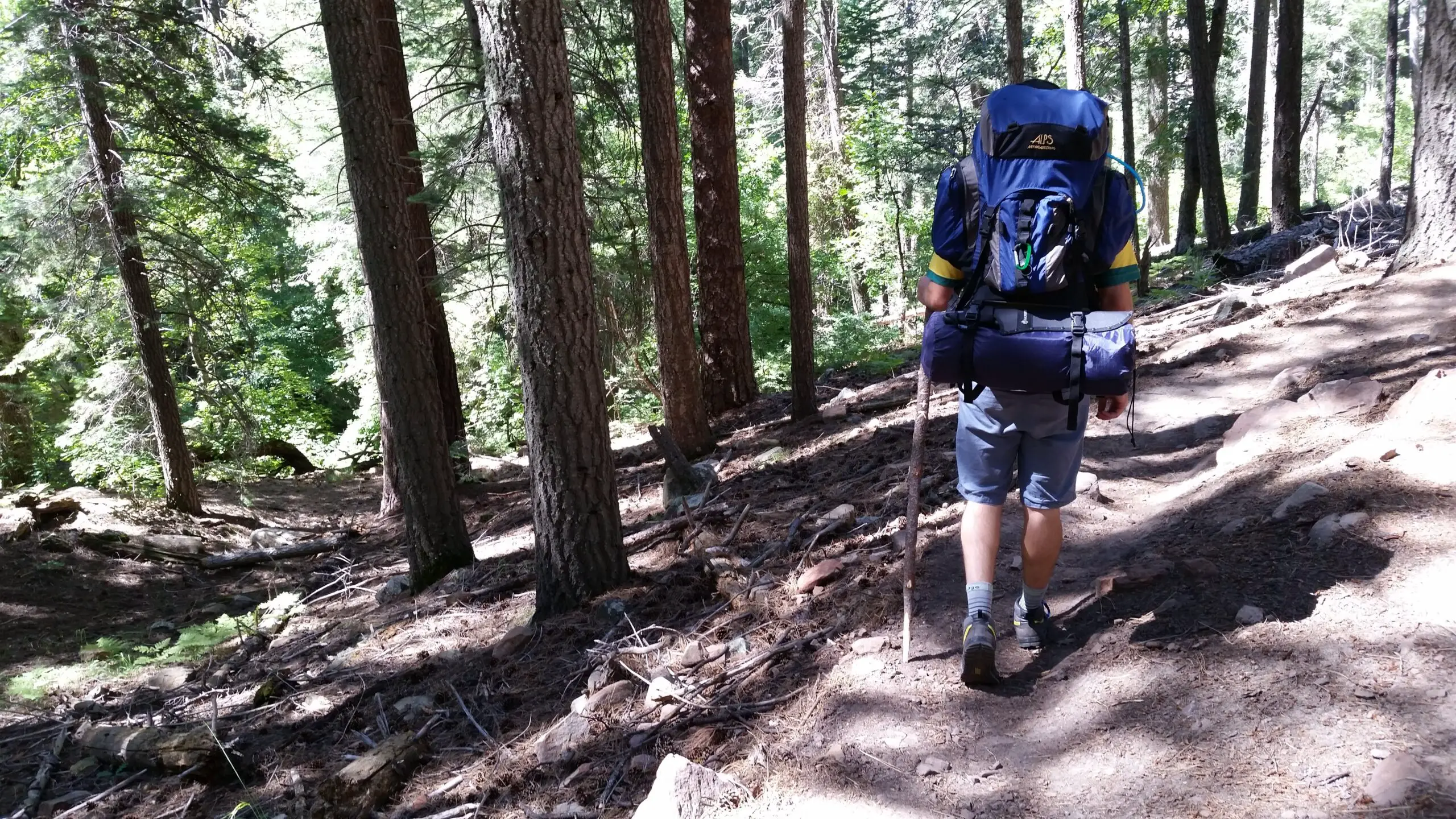Sometimes the terms Backpacking and Hiking are used interchangeably, and can be confusing. In some places in the world, Backpacking is always Hiking, but in others Backpacking is an entirely different activity. Hopefully this clears up the confusion.
Hiking refers to traveling on foot in the outdoors, usually on natural or sculpted trails. The term hiking usually refers to an activity that takes less than a day. Backpacking, on the other hand, refers to hiking with a pack full of equipment to spend one night or more camping. In some parts of the world, like Europe, Backpacking also refers to travelling multiple days with everything you need in a pack, though not necessarily in the outdoors or camping.
Both activities are a lot of fun, and many people participate in both of them. Here are some of the important finer details about the differences between hiking and backpacking.
What’s the Difference Between Hiking and Backpacking?
If someone invites you to go hiking you can expect to go on a walk in the outdoors that lasts anywhere from a few hours to most of a day. In the vast majority of cases, the trail will be made of dirt rather than boardwalk or cement; however, in some areas people have had to fortify the trail due to erosion from lots of use.
On a hiking trip you still need to carry a backpack, but it includes things like snacks, water, and emergency gear- not a tent and sleeping bag. Your pack is a lot lighter hiking, which means moving faster and covering more ground during the shorter period of time.
What Qualifies as Backpacking?
Backpacking is carrying the equipment you need to spend a night or more on your back. This can be for a simple overnight trip in the mountains, for a week through tourist sites in Europe, or for a multi-month trip on the Appalachian trail.
In order the qualify as backpacking the only real requirement is that you carry everything you need with you. A pack can get really heavy really quickly, so its important to select the right gear to bring and to only bring what you absolutely need.
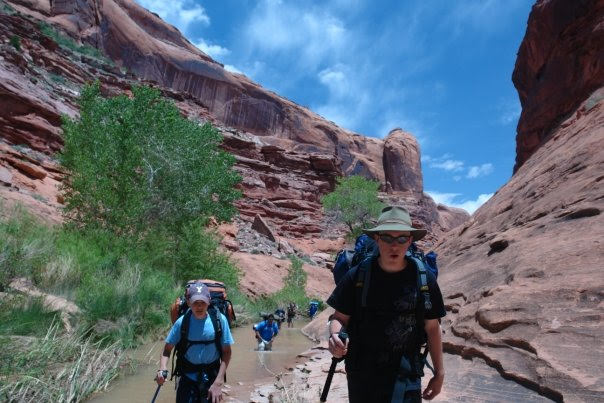
What Skills are Required for Backpacking versus Hiking?
The skills you need for hiking are all also required for backpacking. You need to be able to route-find with a map and compass or a GPS unit, you need to be proficient in the outdoors evaluating potential inclement weather or dangerous trail systems, and you need to know enough first aid and survival knowledge to get yourself out of any situation you get yourself into.
With backpacking, these challenges are intensified. Instead of just being in the outdoors for a few hours during the day, you have to make it through the difficult nights. Instead of bringing along snacks for a hike, you have to sit down and make meals.
One of the most appealing aspects of backpacking is the remoteness of it. Backpackers generally follow a trail for most of the hike, but then disappear into the woods to pitch camp in a place with more solitude. They get to actually become a part of nature instead of just passing through.
Backpackers have to be able to erect a shelter, cook food and dispose of waste, and carry it all on their backs. Due to the remoteness of backpacking, they’re also much more likely to have encounters with wild animals as well.
Types of Backpacking
There are several different types of backpacking that are important to distinguish between, since some of them involve very different gear sets and lengths of time. The main idea is the same- traveling overnight carrying your gear- but the type of gear involved is different.
Through-Hiking, Section Hiking
Popularized by the Appalachian Trail in the US and stories of trekkers across the European and Asian Continents, Through-Hiking is when you start at one point and travel overnight for a period of time to another point where you’ll be picked up or will have to find another way home.
Through-hiking can be done solo, or with a small group. Often through-hikers describe the experience of meeting other hikers as one of the most important parts of the journey.
With through-hiking, the journey is often a life-changing and an enlightening experience. The world outside slows down to a stop as you walk, step after step, for days and weeks and months.
The most popular through hiking trails in the US are the Appalachian Trail on the East side of the US and the Pacific Crest Trail along the West Side. More through-hiking trails are completed or linked every year in different areas.
A subset of through-hiking is section hiking, which is when a backpacker selects a portion of one of these larger trail systems to tackle instead of doing the whole thing. People often take this approach as training for a longer hike, or if they are unable to completely pause their lives for longer periods of time.
Other Types of Backpacking
Looking at the technical definition, a mountaineering expedition would be considered backpacking because the group hauls its gear on its backs and spends more than a day on the mountain. Bikepacking (traveling with all your gear on your bike) isn’t backpacking, but is very similar.
expedition would be considered backpacking because the group hauls its gear on its backs and spends more than a day on the mountain. Bikepacking (traveling with all your gear on your bike) isn’t backpacking, but is very similar.
A multi-day canyoneering trip could also be backpacking. A multi-night trip where you hike in to a lake to do some fishing or an area to do some hunting or climbing would also be a backpacking trip, even if you only hike in the first day and out the last day and spend the rest of the time in one area.
could also be backpacking. A multi-night trip where you hike in to a lake to do some fishing or an area to do some hunting or climbing would also be a backpacking trip, even if you only hike in the first day and out the last day and spend the rest of the time in one area.
European Backpacking vs. American Backpacking
What I’ve described thus far is American Backpacking- overnight camping in the outdoors after carrying your equipment on your back. Someone “Backpacking Europe” on Spring Break or for a summer has a very different experience. A lot of this is due to the amount of Public Land in the US that anyone is free to travel through and sleep on.
The European Backpacking experience still involves carrying all of your equipment on your back, but usually involves traveling through cities and staying in hostels and hotels instead of outside in a tent. The aspect of adventure is similar with the transient, minimalist lifestyle and loose plans, but city traveling is different from traveling in the outdoors.
My brother has spent a couple of summers backpacking Europe, spending time working along the way on farms and in other situations to earn money to continue his travels. Throughout these longer periods of time he’d set up a home base at a work place and then travel around to different regions and countries for weeks at a time.
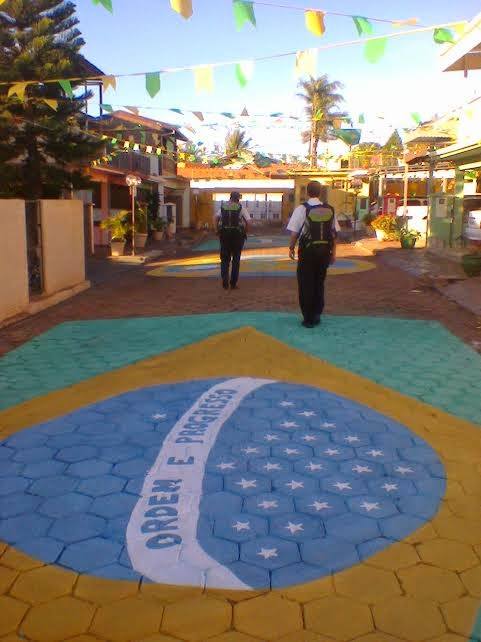
Benefits of Backpacking the European Way
The benefits of backpacking like this are that you are much more fully immersed in a place because you’re using your feet and local public transportation to get around. It’s different than traveling to somewhere like Mexico where vacationers often take a taxi from the airport to the resort and stay in a resort all week.
Backpacking through a country or continent forces you to interact with locals and eat their food and stay with other travelers in hostels. The minimalist approach lets you adapt and adjust your plans as needed and removes a lot of the bulkiness of multiple suitcases. It’s a streamlined version of the typical vacation.
Benefits of Backpacking the American Way
Backpacking comes from the exploration of the American Frontier. Explorers and trappers, adventurers, traveled this way for a long time as the West was won. Native Americans lived in a similar way, moving everything they owned on their backs or on pack animals to different areas as seasons changed.
I love backpacking. One of my favorite aspects of it is just the freedom to be able to go wherever I want and stop whenever I want. There’s rarely a true destination or schedule, so I can really just go off and disappear.
Spending a night in a campground is fun, but you’re usually only steps away from someone with a generator running their A/C and watching a movie. Even with car camping on BLM land or Boondocking you have an immediate connection to home via your car.
With backpacking you escape everything and only come back to civilization when you want to. You can go places where few people have ever been and where there are no roads and no reminders of civilization aside from the occasional satellite or airplane. It’s a great way to reset.
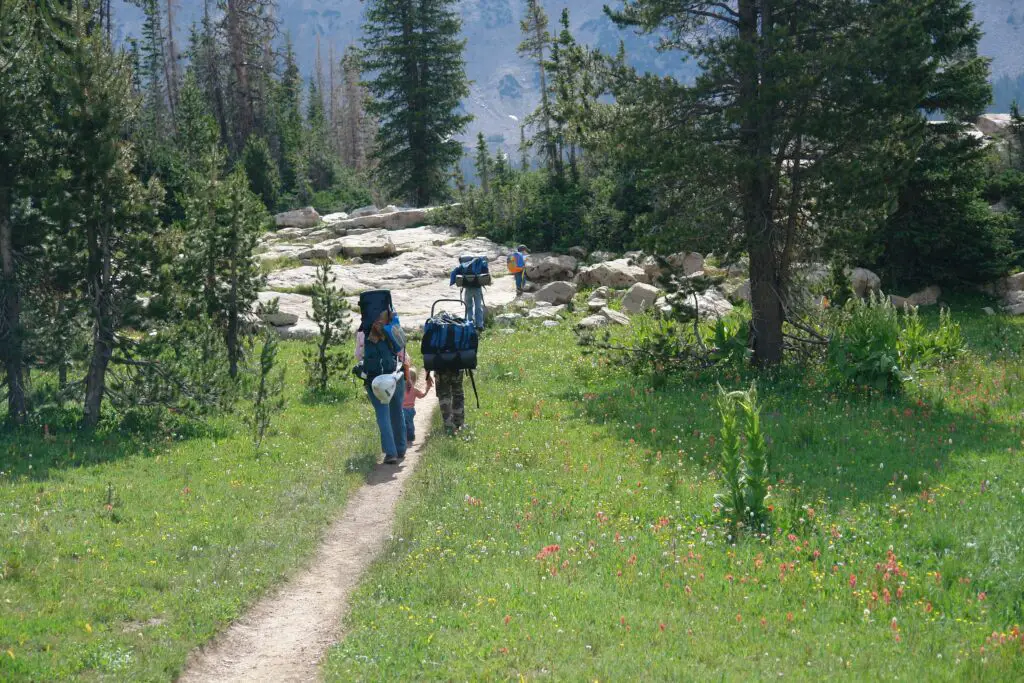
Tips for Backpacking
Watch Your Weight
You really don’t want to carry a two-burner Coleman stove in your backpack for a miles-long slog through the mountains. Even if you can somehow miraculously fit your car camping sleeping bag in your backpack, you don’t want to get stuck with all the extra weight.
Try to keep your backpacking backpack to 20% of your body weight or less. Though challenging, it can be done and will make the whole experience a lot more enjoyable.
Shoes and Boots
A lot of hikers and backpackers make the mistake of picking out a new pair of hiking boots before a trek. They may look flashy and have cool tech and features, but a few miles into the adventure you’re likely to suffer blisters and other sore spots if you don’t give them a chance to break in first.
Hikers and backpackers are increasingly switching from heavy hiking boots to trail running shoes and approach shoes . They’re lighter, they break in faster, and are usually a lot more comfortable. What’s sacrificed in the foot and ankle protection area is made up for by the relatively tame trails most of us tackle.
. They’re lighter, they break in faster, and are usually a lot more comfortable. What’s sacrificed in the foot and ankle protection area is made up for by the relatively tame trails most of us tackle.
Keep Meals Simple
Pretty much anything you eat after a long hike with a backpack will taste incredible. Don’t over complicate meals with multiple dishes or courses. It’s easiest just to go with a freeze-dried meal from someone like Mountain House and boil some water on a backpacking stove. It tastes amazing when you’re tired, too.
Filter Water
One of the heaviest items in most hiker’s backpacks is their water. Two liters of water, a common amount for hikers, weighs as much as some backpacking tents and sleeping bags. Whenever possible, you should bring a water purification system and limit the amount of water you carry to just a bottle or what you need between fill ups.
Water purification has come a long way since iodine tablets, though that’s still a viable option. I’ve written a lot about water filters previously, which you can read in this article: How to Purify Water When Camping .
.
Summary
Backpacking is always also considered hiking, as long as you’re in the US. Backpacking is slower than hiking because of the added weight, and a backpacking trip is multiple days while a hike is usually just a few hours or part of a day.
Both activities are a lot of fun and a good recharge away from regular civilization, but the longer exposure and immersion of backpacking can provide a more in-depth recharge and often more remoteness.
Related Questions
How Long is a Backpacking Trip? A backpacking trip is at least one night, and can last as long as several months. The length can vary from a mile or two or a few kilometres to hundreds or thousands of miles over a few months.
Is Camping the Same as Backpacking? The difference between camping and backpacking is backpacking requires you to carry your gear on your back, whereas camping can be done straight out of a car or camper. All backpacking is also camping, but not all camping is also backpacking.
